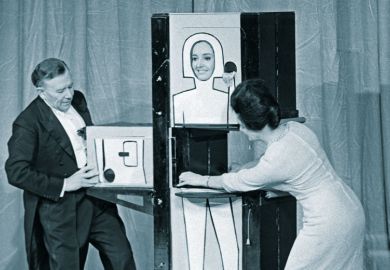Disruption caused by an indefinite marking boycott might prove effective in securing UK academics a better deal on pay and working conditions, but “war-weariness” and heavy-handed tactics from employers could still derail the effort at a “fragile” moment.
Up to 145 universities could be affected by the University and College Union (UCU) action, which started on 20 April, with graduations said to be in doubt as assessment grinds to a halt in some departments. General secretary Jo Grady said university staff “have been crystal clear that they are worth more than what has been put on the table, and now bosses need to wake up and prevent widespread disruption”.
The boycott covers setting and marking essays and exams, invigilation and external validation of grades. While academics are continuing to teach and carry out other duties, more than 60 employers have promised to deduct between 50 and 100 per cent of wages from those taking part. Employers have argued those refusing to mark are not fulfilling their contracts and therefore they are legally entitled to withhold their pay.
Raj Jethwa, the chief executive of the Universities and Colleges Employers Association (Ucea), said institutions “have a duty to protect their students and so they reject partial performance and - as UCU knows - they are legally entitled to withhold full pay for partial performance of duties”.
“HE institutions respect employees’ right to take lawful industrial action and, in turn, UCU needs to respect the employers' right to withhold pay for not fulfilling contracts”, he added. “Each autonomous HE institution is of course fully focused on managing this period of potential disruption as best they can for their students. We are disappointed that UCU is encouraging its members to target students.”
Such a tactic has been met with calls for the UCU to respond by calling more strikes, while the union has also been trying to increase fundraising to support affected academics and some have been urging it to test the legality of such deductions in court.
David Mead, professor of UK human rights law at the University of East Anglia, has argued that employers that make wage deductions that are not proportionate to the loss suffered are acting unlawfully by contravening the Human Rights Act.
Even the threat of such deductions – irrespective of whether it is carried out – was unlawful, Professor Mead claimed, because if someone decided not to engage in the boycott in fear of such reprisals then they had been “chilled” from lawfully exercising their human rights.
“Human rights law requires a balancing of all the competing imperatives, including the right to withdraw labour in pursuit of better terms and conditions –…rather than a one-sided right for an employer to make deductions in full no matter how little work is actually not done,” he said.
The union has claimed that the fact that employers are making such threats at all demonstrates the fear a marking boycott has instilled. The tactic is seen as potentially one of the most powerful at academics’ disposal after branch-level boycotts last year proved far more effective than strikes at moving employers into offering local deals.
But the UCU faces a challenge in ensuring that participation is high enough to cause the necessary disruption after months of division among members and uncertainty over where the campaign goes next. Progress is deadlocked after an offer from employers to look at phasing out zero-hours contracts as a starting point for further talks on fixing the sector’s issues was rejected in a consultative vote by 56 per cent of 35,000 members, after they were advised to do so by the union's higher education committee.
Faint hopes that the 2023-24 pay rise of between 5 and 8 per cent might still be increased are also fading fast, given that this has already been partially implemented by most institutions.
Industrial relations expert Gregor Gall, a visiting professor at the University of Leeds, said the marking boycott would be the “ultimate test of the ammunition of UCU members”, but questions remained over whether it had started early enough to seriously disrupt assessment, especially “as the ‘big bang’ of finals and end of year exams is not what it used to be”.
“The turnout in the consultative ballot, along with the less than compelling vote to reject, does suggest some war-weariness might have set in,” he added.
Glen O’Hara, professor of modern and contemporary history at Oxford Brookes University, predicted a “fragmented response” to the boycott, with some academics opting out owing to their being unable to afford the pay deductions or feeling that “they can’t do that to the students”.
“I think the worst thing about that for students is that it might be unclear to them who is going to mark and who isn’t, leading to deep uncertainty,” he said.
The union has said the result of its reballot – where 85.6 per cent of voting members backed extending strike action for a further six months on a 56.4 per cent turnout – showed that enthusiasm for industrial action remained strong.
Progress in the separate pensions dispute had re-energised some within the union, said Professor Gall, but the “four fights” campaign – on pay, workload, equality and casualisation – was a “harder battle to win given that the impact of the changes in pensions will have less of an effect on university finances and kick in over a much longer period of time”.
Roger Seifert, emeritus professor of industrial relations at Wolverhampton University, said the situation “remained tense and unresolved”, with both sides in a “fragile and risky position”, but employers appeared happy to “sit on their hands” in the hope that support for industrial action would wane and the union would split and weaken.
“UCU still has some momentum due to the extent of anger among members, the strikes by others and a sense this is the battle to be won.
“Overall, marking and assessment boycotts can be very effective, but the main burden tends to fall on the shoulders of relatively few staff. This can be a recipe for division, although at the moment that is not apparent.”

